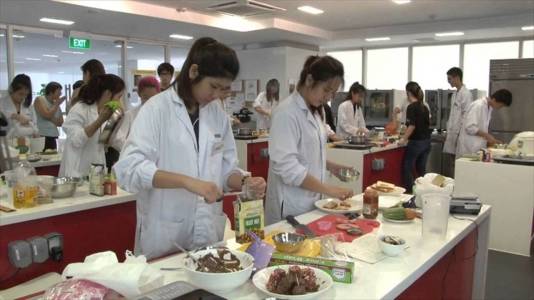When I was a PhD student, a researcher that I admired once told me that half the research in labs is done in corridors and coffee rooms. Of course he didn’t mean that the dire restrictions of lab and office spaces faced by academia nowadays force half of us to install their benches or computers there. Even in France. What he meant was that in academia the social aspect is very important, and that social gatherings, such as coffee breaks, are not to be neglected because they are not just breaks from work and coffee loading. They are more than that. They are crucial because that’s where scientists chat. They of course sometimes chat about mundane topics, such as whether Schrödinger’s cat is male or female or both, or why 42 and not 43, or 41. But they most of the time talk about their work. Yes, most of us are in the latest stage of nerdiness and can’t be saved anymore.
And chatting about studies is really important for two things. Well, three, because it also gives you information about what the guy on the desk next to you is spending his days on (beside Facebook), which can be interesting, if not utterly fascinating (sometimes). But regarding your own research progress it’s important because it forces you to synthesize and to structure your thoughts about your work (the whole of it, or a more specific problem). This effort alone can benefit you a lot. Sometimes it will help you to get unstuck or to spot a weak link in your reasoning; sometimes it will just help you see more clearly your problem and go forward more easily. The second reason is that you can get feedback that can in many times be useful, be it from someone close to your topic or on the contrary rather remote.
With this in mind, we have set up three types of regular meetings in our group (in addition to the boring ones). The first one is the SemiBeer. We’ve talk about it here. But in a nutshell, it’s a Journal Club with two twists: 1/ we treat unconventional papers, such as funny ones, articles about controversies or papers about carrier and 2/ we drink beer (or other stuff, with peanuts and crackers, what we call apéro in France, a key cultural tradition that every other country on Earth should copy).
The second type of socio-scientific meeting is the Teameeting. That’s where we discuss problems encountered by a team member. We just gather around a table with a computer and sheets of paper and someone presents where (s)he’s stuck in her/his topic and others try to give suggestions. A brainstorming session set up at teatime, so with homemade cookies and similar goodies, hence the super pun I’m so proud of: Tea-meeting / Team-eating. Oh God, am I good when it comes to food…
The last type of meetings that we have is the Breakfast Club. As you may have guessed (I hope for you), this one is in the morning, very very early (9 am) and we discuss about carrier. Students ask a question, such as how to best find a supervisor for a PhD or how to balance work and personal life, and the postdocs and PIs give them their famed wisdom. And we eat croissants and other morning delights with tea and coffee and good ambiance.
So if I count well, we’ve been very serious scientifically, because we’ve covered breakfast, tea time and apéro. And of course everyday we all have lunch together at the canteen of the university. Now I just need to do something about Elevenses, and we’d be one step closer to the Hobbits.
 Yes, that’s my lab and yes I told them not to eat while doing experiments
Yes, that’s my lab and yes I told them not to eat while doing experiments





















On dit que l’éducation se fait par l’exemple !! Tu m’étonnes que ton fils pense régulièrement à concocter de bonnes choses !!!!
LikeLiked by 1 person
Leading by example is the only way
LikeLiked by 1 person